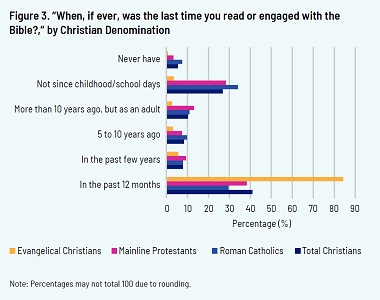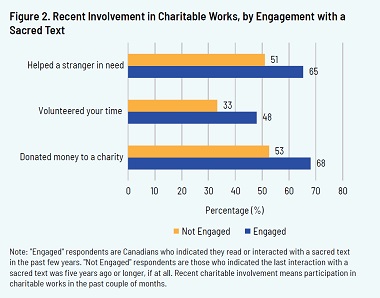 The Bible is central to Christianity, but how central is it in the daily lives of Canadian Christians Cardus released a 32-page report May 2 which investigates that question.
The Bible is central to Christianity, but how central is it in the daily lives of Canadian Christians Cardus released a 32-page report May 2 which investigates that question.
Daniel Proussalidis, Director Communications for Cardus, emailed this release:
The latest report from Cardus, The Bible and Us: Canadians and Their Relationship with Scripture, suggests Canadian Christians are a mixed bag in terms of Biblical engagement.
Among other things, this report finds:
-
- 63% of Canadian Christians who have a physical copy of the Bible at home never or hardly ever read it and almost the same percentage believe the Bible teaches “essentially the same things” as other religions’ scriptures.
- The proportion of Evangelicals who read their home copy of the Bible weekly is at least four times as large as the proportion of Roman Catholics or Mainline Protestants who do the same.
- The proportion of Roman Catholics and Mainline Protestants who view the Bible as a collection of fables or an irrelevant ancient book is four times as large as the proportion of Evangelicals who have the same view.
- The proportion of Evangelicals who disagree that the scriptures of all major world religions teach essentially the same things is about twice as large as the proportion of Roman Catholics and Mainline Protestants who also disagree with that premise.
 The report was written by Andrew P.W. Bennett, Program Director, Faith Communities at Cardus. He is an ordained deacon in the Ukrainian Greek-Catholic Church in the Eparchy (Diocese) of Toronto and Eastern Canada.
The report was written by Andrew P.W. Bennett, Program Director, Faith Communities at Cardus. He is an ordained deacon in the Ukrainian Greek-Catholic Church in the Eparchy (Diocese) of Toronto and Eastern Canada.
Following are some excerpts:
In the summer of 2022, the Canadian Bible Society supported Cardus to undertake a survey with the Angus Reid Institute to find out how Canadians engage with and understand the sacred texts of Christianity, Judaism, and Islam.
The resulting report, ‘The Sacred Texts: Canadian Perspectives on the Bible, Qur’an, Torah and Their Place in Modern Society,’ was released in December 2022. This follow-up report now uses the survey data to delve more deeply into the responses of one group of respondents, Canadian Christians, and their engagement with and attitudes toward the Bible specifically.
This paper is organized by a series of overarching thematic questions: How do Canadian Christians read the Bible? Why do they read the Bible? What do they think about the Bible? and Do they know the Bible?
At the conclusion of each section, we highlight some of the key challenges and opportunities that we think the survey findings reveal. We then provide some discussion questions to help animate conversations in churches and Christian institutions across the country. A secondary goal of this paper is to inform Canadians in general about how their fellow citizens who identify as Christians engage with the Bible.
The survey shows that there are often significant differences among Christians in how, when, and why they read the Bible. It also reveals that Christians are reading the Bible in different ways, both in terms of reading it in its physical or online form and also in what they understand from their reading.
It is those takeaways that often reveal some of the greatest differences among Canadian Christians’ attitudes about the Bible and its role in their lives and in the life of our country.
Among the questions asked of participants in the survey:
- How often do you engage with the Bible on your own or by yourself?
- How often do you engage the Bible with family?
- What do you take away from reading or studying the Bible?
- In your view is the Bible sexist, racist or homophobic?
- Do you believe that what is taught in the Bible should help define our
laws and how we live together in society?
Each set of responses is accompanied by a graph which illustrates responses by Evangelical Christians, Mainline Protestants and Roman Catholics.
Go here for the full report.

What definition is used for ‘Christians.’ If a person considers the Bible as a collection of fables or an irrelevant ancient book, how on earth can they be considered Christian? Christ, as recorded in Matthew 4:4 declared that we are to live by every word that comes from the mouth of God.
The Bible is absolutely central to the Christian faith, so to fail to read it or to consider it as fictional or irrelevant can hardly be the practice or mindset of any genuine Christian.